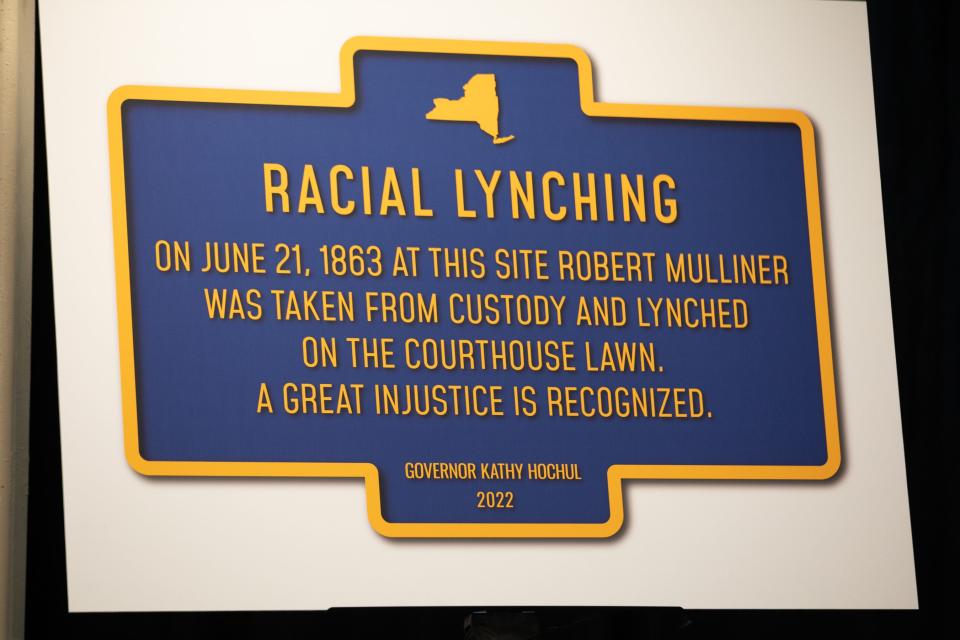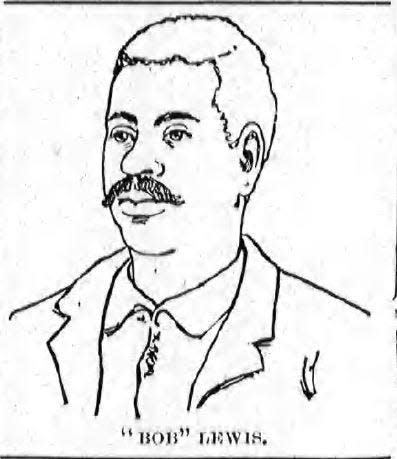Hochul unveils markers recognizing injustices to Black men lynched in Newburgh and Port Jervis
- Oops!Something went wrong.Please try again later.
CITY OF NEWBURGH - By this summer, the lives of two Black men from Orange County lynched in the 1800s will be memorialized with historical markers.
It's part of remembering an aspect of local Black history that has, since their deaths, gone largely unmentioned in the community, according to several lawmakers who spoke on Feb. 23 at the Newburgh Heritage Center.

Dozens of people crammed into 123 Grand St. to hear more about the stories of Robert Lewis and Robert Mulliner. Gov. Kathy Hochul, who hosted the event, unveiled depictions of the markers.
"A great injustice is recognized," reads a line at the bottom of each sign.
Lewis and Mulliner were lynched by angry mobs 30 years apart. Lewis was killed in Port Jervis. Mulliner was killed in Newburgh. Both had been accused of raping white women.
Sins of the past: Walk remembers man lynched in Port Jervis in 1892
Food: Unique all-you-can-eat restaurant coming to Wappinger, Newburgh
Hot real estate: Home prices rose year over year in Orange County
Lewis of Port Jervis was accused on June 2, 1892 of raping a white woman that day on a riverbank where the Cuddeback Brook meets the Neversink River. According to contemporaneous news accounts, witnesses claimed Lewis kept them at bay by brandishing a loaded revolver, and then fled. Lewis was captured on a boat near Huguenot by local men, who took him back to Port Jervis to the police station on Front Street. The mob intercepted them there.

Robert Mulliner was an itinerant worker in Newburgh who picked up jobs where he could, according to city Historian Mary McTamaney. He was accused of raping a white woman on June 19, 1863. The woman was said to have been an Irish immigrant who had recently arrived in Newburgh. Mulliner was arrested in Fishkill later that night and jailed at the old courthouse in Newburgh located at 123 Grand St, according to history McTamaney was able to gather.
Two days later, an angry mob of locals broke through the courthouse doors, dragged out Mulliner, and he was hanged on a tree.
McTamaney said she has not found records of other lynchings in Newburgh.
"It was a very sad moment in our history," McTamaney said when reached by phone.
Ray Harvey, president of the NAACP's Newburgh-Highland Falls chapter, who attended the Wednesday event, described this as an educational moment for the community.
The Port Jervis group, Friends of Robert Lewis, linked up with the Newburgh-Highland/Falls chapter of the NAACP to gather history about the stories of the two men.
A dedication ceremony for Lewis' marker will take place this summer in Port Jervis. Plans for Mulliners' marker were not immediately made known.
lbellamy@th-record.com
This article originally appeared on Times Herald-Record: Hochul unveils markers to memorialize two Black men lynched in 1800s

